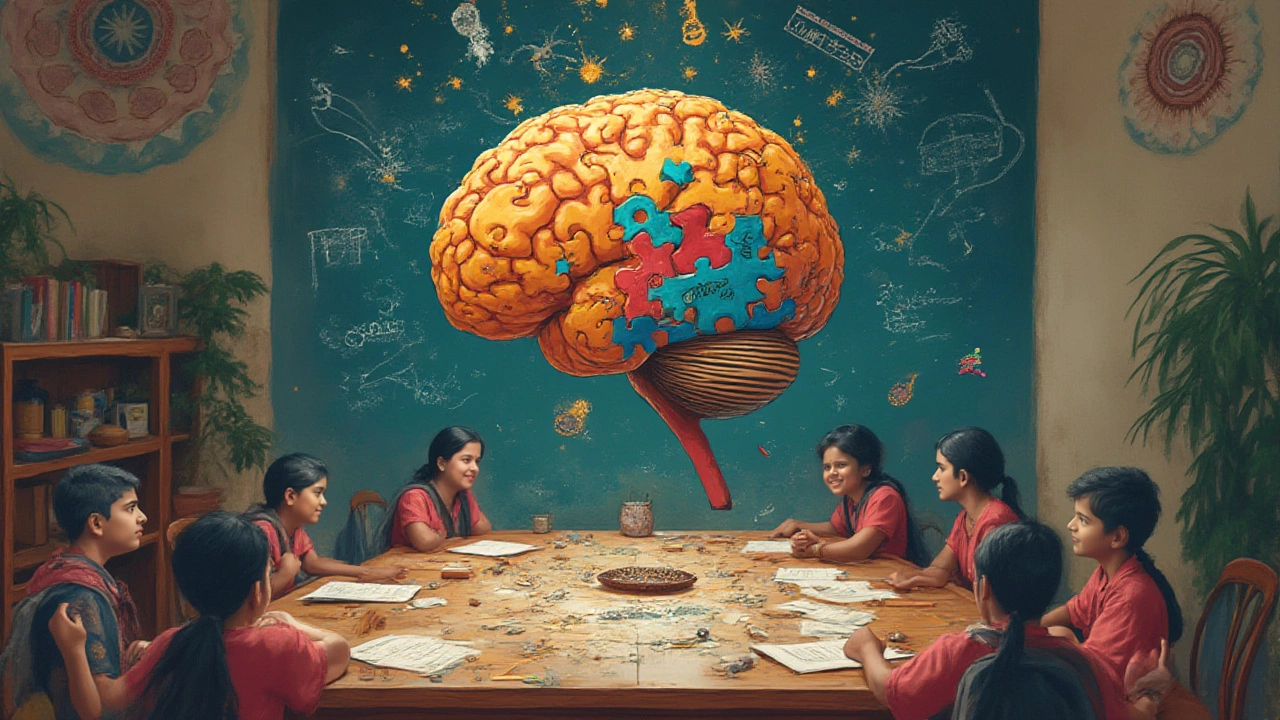It might surprise you, but every year, thousands of JEE Mains aspirants argue over whether mental ability questions are part of the exam. If you've ever skimmed YouTube comments, online coaching WhatsApp groups, or Reddit threads for JEE tips, you've probably seen heated debates about "mental ability." Some call it reasoning, others think it's more like brain-teasers, and a few dismiss it as a myth. Now, if you’re preparing for JEE Mains in 2025, this confusion is not just noise—it can waste your precious time or, worse, narrow your preparation focus.
What Exactly is Mental Ability?
The phrase "mental ability" gets thrown around in exam circles all the time, but what does it actually mean for JEE Mains? When most people say mental ability, they picture puzzles, logical reasoning, series completion, maybe those odd one out or seating arrangement questions. In college entrance exams in India, like the NTSE (National Talent Search Examination) or sometimes in company recruitment aptitude tests, mental ability sections are common. But is this the same for JEE Mains?
JEE Mains officially tests Physics, Chemistry, and Mathematics. The syllabus published by the National Testing Agency (NTA)—which runs the exam—lays out the topics in detail for each subject. If you glance over the syllabus (you can find the PDF on the official JEE website), there isn’t a dedicated section titled "Mental Ability." No direct logical reasoning, no dedicated section for analogies, coding-decoding, or syllogisms like you find in MBA entrance tests or bank PO exams.
But here’s the twist: while they don’t overtly label it as such, the exam itself is packed with questions that push your mind to juggle information, connect dots fast and reason on the spot. Take Physics, for example. In Mechanics or Modern Physics, you regularly face application-based questions that demand a strong chain of logic and the ability to spot what's relevant and what’s a red herring. Mathematics, especially, is notorious for questions where, unless you see the right pattern or trick, you’re stuck for ages. In this sense, mental ability is baked into how questions are set, not called out as a separate section.
One famous example: in JEE Mains 2021, there was a trigonometry question that needed you to visualize shapes and rotate axes—more visualization than calculation. Another: certain Chemistry problems, especially in topics like organic reaction mechanisms, demand sequential reasoning to work through possible paths. If this isn’t a test of mental ability, what is?
The Role of Mental Ability in the JEE Mains Pattern
Now, hear this: mental ability questions in the purest sense—say, decoding patterns or doing verbal reasoning—honestly, you won’t spot these in JEE Mains papers from the last decade. The focus sticks to subject knowledge and problem-solving. But the mental demands of the paper are steep.
The exam gives you just three hours to answer 90 questions (30 each from Maths, Physics, Chemistry, with only 75 attempted for marks). Here’s what makes it unique: the questions aren’t just about what you studied, but about how quickly and smartly you can use that knowledge under stress. JEE Mains is less about rote memorization and more about speedy analysis, pattern recognition, and handling pressure.
Let’s talk stats. In JEE Mains 2024, around 13 lakh students registered, and the top 2 lakh scorers were eligible for JEE Advanced. Those who cracked the top 5000 almost always share a common skill-set: quick critical thinking and mental endurance, not just bookish knowledge. It’s this reasoning muscle—call it mental ability if you want—that separates toppers from the massive crowd.
| Year | No. of Candidates | Unique Toppers’ Traits |
|---|---|---|
| 2022 | 9.5 lakh | Pattern Recognition, Time Management |
| 2023 | 12.2 lakh | Logical Approach, Fast Calculations |
| 2024 | 13.1 lakh | Mental Endurance, Analytical Thinking |
Notice how the real difference is not a mysterious "mental ability" topic, but the actual skill to take subject knowledge and twist it under time limits and exam stress. This explains why some students with deep theory knowledge score less—they can’t pivot fast during the test.

Where Do Mental Ability-Style Skills Show Up in JEE Mains?
An honest look at past papers is way more revealing than any guesswork. Let me unpack a few types of questions where mental ability really matters—even if it's not mentioned as a syllabus chapter:
- Puzzle-Style Maths: Questions that combine concepts—like coordinate geometry and algebra, or calculus and trigonometry—often disguise basic problems as harder puzzles. Spotting connections fast is key.
- Physics Thought Experiments: Those weird rotating disc problems or electricity and magnetism questions where they tweak the situation and you have to quickly modify known formulae or imagine 3D results.
- Chemistry Logical Chains: Sometimes you’ll get a series of organic conversions, and you need to deduce what reagents work in sequence. It’s like running a logic chain, not just recalling facts.
- Comprehension-Based MCQs: In recent years, JEE Mains started using passage-based, multi-question MCQs, where the info isn’t lifted directly from textbooks. These reward fast comprehension and logical deduction—classic mental ability territory!
In all these cases, the mental ability needed is deeply tied to subject knowledge. If you’re a logic puzzle whiz but have weak maths basics, you’ll still struggle. But, if you blend sharp reasoning with strong subject knowledge, that’s where magic happens.
Smart Tips to Sharpen Your Mental Ability for JEE Mains
Alright, so you can’t expect a neat "Mental Ability" section, but you’re starting to see how reasoning skills make a difference. So how can you actually build these practical brain muscles for JEE Mains?
- Practice Application-Based Problems: Spend more time on questions that mix concepts across chapters. Books like H.C. Verma’s for Physics or Cengage for Maths have a ton of these.
- Timed Mock Tests: Don’t just practice questions—race against the clock. Mental ability is as much about speed and accuracy as it is about logic. Try to solve full-length mock tests in three hours, just like the real exam.
- Analyze Your Mistakes: Every wrong answer is a lesson in how your brain processes (or misprocesses) information. After each test, review how you approached problems, not just whether you got them right or wrong.
- Learn Pattern Recognition: You don’t need to do Sudoku every day, but spending some downtime on logic puzzles can train your brain to spot patterns faster. Try online puzzle portals, especially ones that involve grid logic or sequence prediction.
- Mental Calculations: Drop the calculator—train yourself to do calculations mentally. The less you write, the faster you solve. Tricks for multiplying, squaring, or finding cube roots quickly are game-changers.
- Group Study with a Twist: Set up problem-solving marathons with your friends. Compete to see who solves a tricky question first, but make a rule: after each problem, you each explain your thought process, not just your answer.
- Visualization Affirmations: For geometry and Physics (like mechanics or optics), practice visualizing problems before you touch pen to paper. Mental ability here is about "seeing" the problem play out in your head.
These tricks might look simple, but they directly mirror what JEE Mains really asks of you: the power to think, connect, and execute fast.

Should You Worry About Mental Ability for JEE Mains?
This is where it gets personal. If you’ve got a cousin or parent who cleared JEE a decade ago, you’ve probably heard, “Just finish the NCERTs.” There’s some truth, but the competition now is wilder. JEE Mains isn’t adding a mental ability section, but the style of questioning—context-based, twisty, and fast-moving—demands those skills anyway.
A lot of toppers I’ve met in coaching centers across Mumbai and Kota talk about hitting a wall just before Mains. It’s rarely because they don’t know enough, but because the pressure and tricky twists in the questions throw them off. What saves them is not extra cramming, but strong mental agility trained in problem-tough environments—timed mocks, group contests, and relentless mistake analysis.
The trend is only going to sharpen. If you look at the last three years’ papers, there’s a visible increase in application-based, multi-concept problems. If you start early, building mental stamina and flexible thinking, you’re not just prepping for JEE, but for real-world engineering, where problems aren’t split into neat textbook chapters.
So, stop hunting for mental ability books specific to JEE. Instead, focus on integrating reasoning, smart judgment, and relentless practice right into your Maths, Physics, and Chemistry prep. That’s how you win this game.
